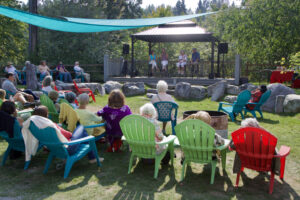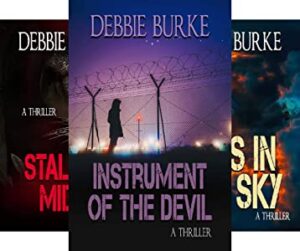by Debbie Burke

Mark Leichliter and Debbie Burke
A few days ago, my friend and writing colleague Mark Leichliter (who also writes as “Mark Hummel“) spoke to a group at a local active senior community.
Mark is a delightful, articulate guy who writes mystery and literary fiction. He also ghostwrites and teaches creative writing, although he finds the term “creative writing” redundant because he says, “All writing is creative.”
He’s the teacher you wish you’d had or would choose to teach your kids. He treats students as individuals, listening to their needs, encouraging them to pursue their dreams. Years after they graduate, students stay in touch with him.
I learned about Mark’s appearance at the senior community a short time before and on the spur of the moment decided to attend.
I didn’t expect his talk to lead to a post for TKZ. But here it is.
First thing Mark did was to rearrange the chairs from auditorium-style seating into a circle. “I want this to be a conversation, not a lecture,” he said. “I want to learn from you in the audience.”
His premise began that curiosity and creativity are linked. Curious people are also often creative. Curiosity makes them eager to learn and they create art, music, poetry, books, buildings, automobiles, recipes, etc. from what they learn.
I mentioned creativity was also the ability to take apparently unrelated ideas and find a connection between them.
Mark laughed and said I must be his shill because the concept of connection led into his next point.
He cited a friend who’s now writing a memoir. “Al” was a former mining engineer tasked with building a gold mine in Columbia. His employer was willing to pay top wages to attract workers to an area that was otherwise desolate. Al could have simply built the mine then moved on, one and done.
Instead, he was curious about the people and surroundings. He spent weeks exploring and talking with them, and learned there was no infrastructure, no water or power. Those conditions meant that workers couldn’t bring their families with them to the new mining jobs. A lucrative paycheck was a draw, but it wasn’t enough.
Al’s creativity took over. He connected the needs of the mine with the needs of the workers and projected into the future.
A mine would do well but was a finite operation—it lasted several years then shut down. He convinced mine owners to pay workers a little less and instead to budget that money to bring in electricity and water, leading to building a town with a grocery store to provide food, a school to educate their children, and other services. Mining would “do well” but building a lasting community would “do good.”
Al is now using curiosity and creativity to connect events in his life and solve problems as he writes his memoir.
Mark then asked the group about their individual creative endeavors.
A woman related that she and her husband had traveled extensively, getting to know and live with residents of other countries. Their endless curiosity about other cultures led to broadening their knowledge and understanding, resulting in rich rewards they never could have anticipated.
Another woman said she quilted, using fabric from her grandchildren’s outgrown clothes and sports uniforms. She created quilts that reflected each child’s particular interest and favorite activities, a physical, visual canvas of the stories of their lives.
Another said she was creating an “ethical will.” Instead of leaving material possessions to her children and grandchildren, she wants to leave family memories, lessons learned, advice, etc. in written form. Her title is More Than Stuff.
Another said she’d published a family history without telling her siblings. When she eventually let them know, a sister revealed she too had published a family history without telling anyone. Not surprisingly, the stories were completely different, giving rise to disagreements: “That’s not how it happened!”
That led to group discussion of differing perceptions. The same event happens to each family member, but all have their own memory and interpretation of the incident that is often radically different from the others.
A genealogist commented that “a lot of family history is fiction,” which prompted knowing laughter in the group.
“Leaving a legacy” was the common theme among the audience.
Mark connected the legacy angle back to storytelling. Humans are curious about past events and why they happened. Storytelling is a creative way to preserve, understand, and pass down those events to educate future generations. Stories explore the reasons and causes behind life’s mysteries and strive to make sense of them. Stories also serve as vehicles to teach ways to solve problems and survive.
Mark made another point I hadn’t considered before. He said a book doesn’t fully exist without a reader. Other communication and entertainment forms like TV, films, streaming, etc. continue whether or not anyone is watching. They are one-way activities that don’t require participation.
In contrast, a book is a two-way interactive exchange. The author creates it but, until someone picks it up and starts reading, it simply sits there. It’s a repository of knowledge, waiting to interact with a person. When the connection between the author and reader is made, it opens the door to an entirely new world.
Curiosity, creativity, and connections.
Because I was curious about Mark’s talk, I picked up creative ideas from it, and connected them into today’s post. Thanks, Mark!
~~~
TKZers: Does curiosity enhance your creativity? Do such connections find their way into your writing? Please share some examples.
~~~
Curiosity leads investigator Tawny Lindholm into a creative deep fake trap. Can she connect clues in time to save herself and an unjustly accused woman? Find out in Deep Fake Double Down.


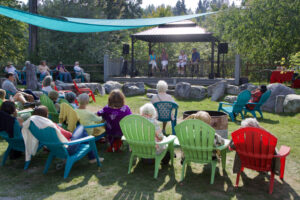
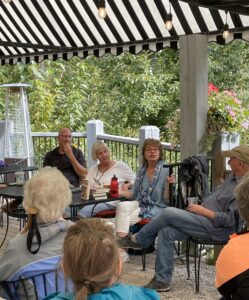 In the past, we had talked from the stage and needed sound equipment. Now we sat at chairs and tables in an area small enough that people could hear us without mics.
In the past, we had talked from the stage and needed sound equipment. Now we sat at chairs and tables in an area small enough that people could hear us without mics.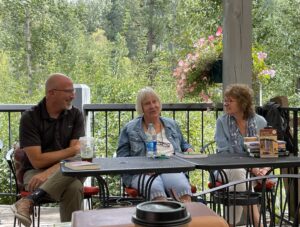

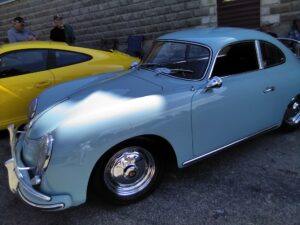
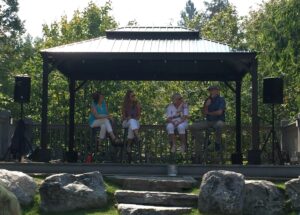
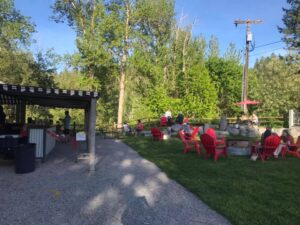
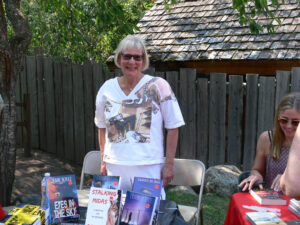 Beforehand, set up your own book table.
Beforehand, set up your own book table.